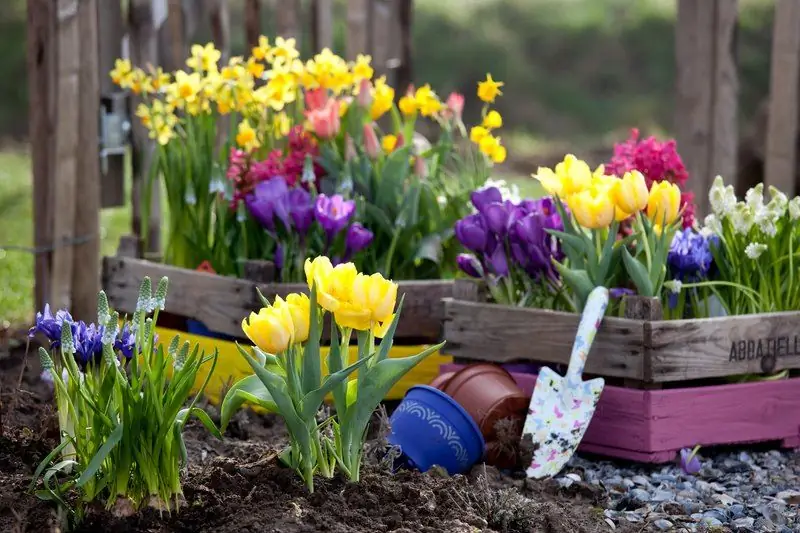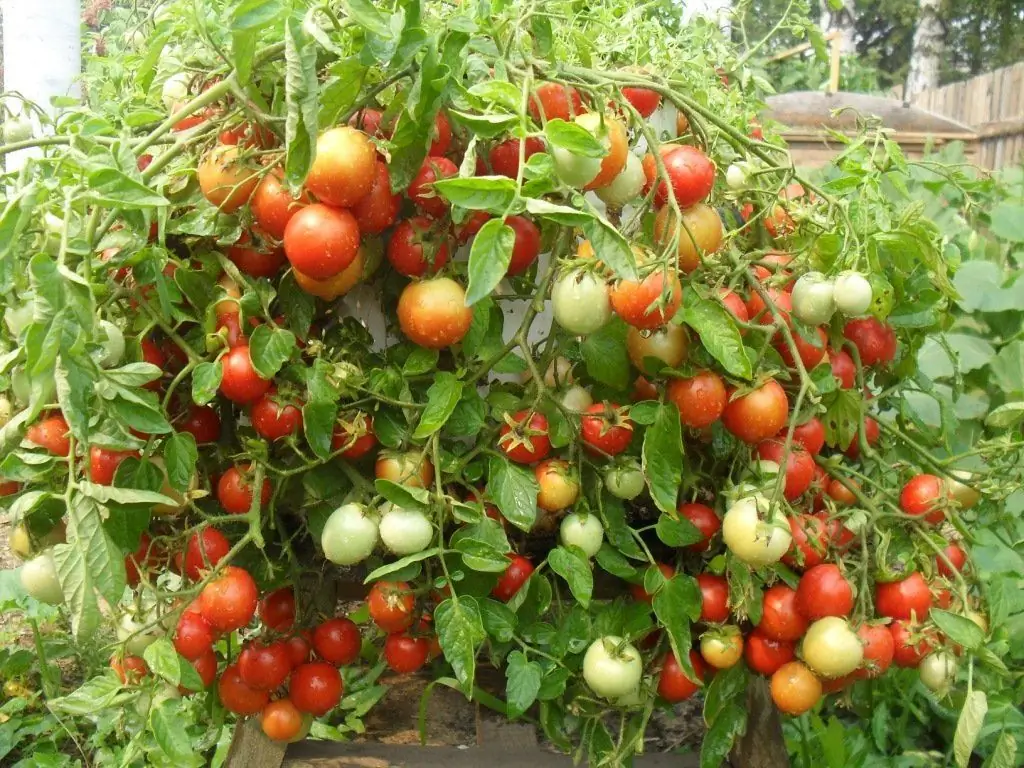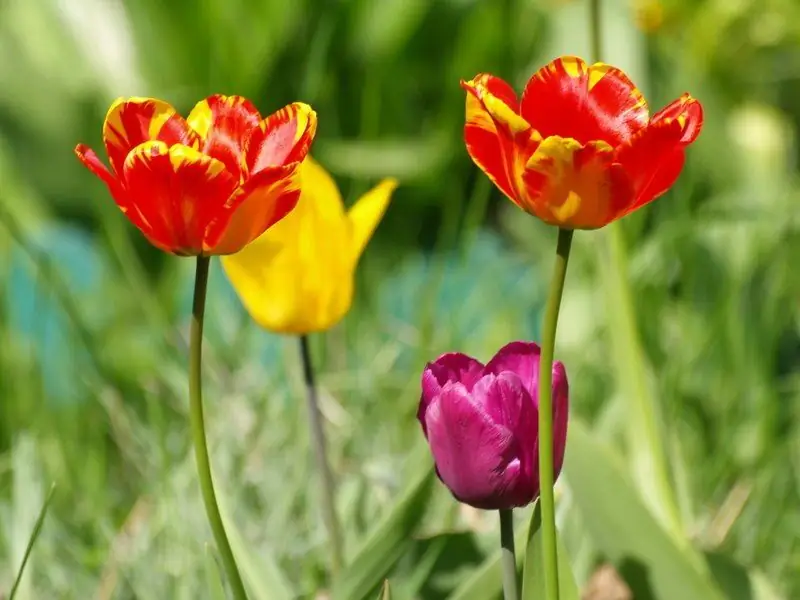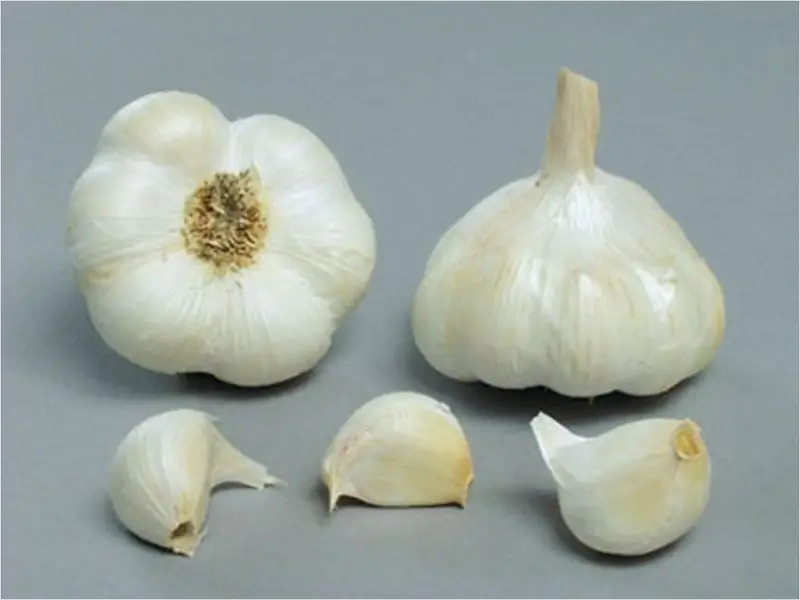
Table of contents:
- Author Bailey Albertson albertson@usefultipsdiy.com.
- Public 2023-12-17 12:53.
- Last modified 2025-06-01 07:32.
Spring planting of tulips: planting on time and right

The tulip is traditionally considered a spring flower; it is one of the first to open its delicate luxurious buds after the end of winter. It is preferable to plant the bulbs of this plant in the fall, but in some situations you have to do the planting in the spring. If you do everything right, then this season the tulip will delight you with flowering, albeit not as abundant and a little later than its fellow tribesmen planted in the fall.
Dates of spring planting of tulips
The specific dates for the spring planting of tulips are determined by the peculiarities of the local climate. The main parameter, which it is customary to focus on when choosing this time, is the soil temperature at the depth of the intended placement of the planting material (about 10 cm). The earth at this depth should warm up to indicators not lower than + 7 … + 9 ° C.

Before planting, it is imperative to measure the temperature of the soil at a depth of about 10 cm
But since the climatic conditions in the regions vary greatly, the timing of planting works is different:
- in warm southern regions, where spring comes earlier, bulbous plants can be planted already in the last decade of February or in early March;
- the climate of the middle zone allows you to start planting work only in April;
- in cold northern regions, planting is not possible until mid-May.

Spring planting dates depend on local climate
You can bring the flowering closer if you place the bulbs in pots or special containers with a substrate in winter, about 3-4 weeks before the expected day of planting in open ground, and until that time keep them at home. In this case, tulips will have time to root well and bloom earlier.

You can plant tulips in pots in winter
Some growers are used to orienting themselves in gardening to the phases of the moon. Favorable days for placing tulips in the ground according to the lunar calendar in 2019 will be:
- in February - 20-25, 28;
- in March - 1-2, 22-29;
- in April - 2-3; 18, 20-26, 29-30;
- in May - 1, 15-18, 26-28, 31.
The year before last, at the end of February, I bought tulip bulbs. The temptation was too great, as the price was very ridiculous and the flowers in the picture were terry and extremely attractive. I dropped them off only after the May holidays, as the spring was cold and late. The leaves came out, but I did not see the buds that season. But the next year, luxurious parrot flowers appeared from each purchased onion. And there are many children around that have already been promised to neighbors.
Video: planting tulips in spring
How to plant tulips in spring
First of all, you need to prepare the planting material:
- the bulbs are carefully sorted out, rejecting all cracked, dried, rotten and damaged specimens;
- then they are disinfected in a solution of potassium permanganate (5%) for 25-30 minutes, drugs Maxim, Fitosporin, etc. (concentration and exposure time according to the instructions);
- for better rooting, the onions are treated with any growth stimulant (Epin, Heteroauxin, etc.);
- dry well.

Tulip bulbs are soaked for half an hour in a solution of potassium permanganate before planting
Planting tulips in open ground
A bed for tulips is laid out in an open, but protected from strong gusts of wind and evenly lit area. The ground is pre-dug 20-25 cm deep, choosing the roots of perennial weeds. Fertilize by introducing during digging:
-
specialized fertilizer for bulbous crops (according to the instructions);

Fertilizer Fertilizer for bulbous crops can be added to the soil during digging
-
organic matter per 1 m 2:
- humus or compost - 15-20 liters;
- wood ash - 150-200 g.
-
mineral fertilizers (per 1 m 2):
- nitrophosphate - 40-45 g;
- superphosphate - 45-50 g;
- potassium sulfate - 25-30 g.
Landing technology:
-
In the garden, grooves or holes are made about 10-15 cm deep.

Landing pits Dig holes or trenches first
- The rows are placed at a distance of 25-30 cm, about 8-10 cm are left between the individual pits.
- Spill abundantly with water.
- A thin layer of coarse river sand is poured onto the bottom.
-
The heads are laid, expecting that the embedding depth is approximately three onion diameters. On average, it turns out:
- 12-15 cm - large;
- 8-10 cm - medium;
-
5-8 cm - children.

Planting depth Tulip bulbs are planted at different depths depending on size
- Sprinkle with fertile garden soil, level and compact a little.
- Watering.
Planting tulips in pots
Tulips can be planted in pots or any other containers for preliminary distillation or for a long time for flowering. In the second case, they are planted in beautiful decorative pots, which are displayed on the terrace, balcony, patio, etc.

Tulips are left in decorative pots for the entire flowering period
The order of work is as follows:
- A layer of drainage (3-5 cm) of expanded clay, pebbles, broken shards, etc. is poured onto the bottom of the dishes.
-
Fill the pots about half with the substrate. This bulbous crop grows best in soils with a neutral to slightly alkaline reaction. You can purchase a ready-made soil mixture or prepare a soil composition yourself from (in equal parts):
- leafy land;
- humus;
- garden land;
- coarse sand;
-
peat.

Priming On sale you can find a special soil for bulbous
- The scaly shell is removed from the heads.
-
Spread the bulbs, keeping 8-10 cm between them. The planting depth also depends on the height of the onion and should be three times more.

Planting in a pot When planting tulips in a pot, do not allow the bulbs to touch
- Cover with soil, leaving 2-3 cm from the edge.
- Water abundantly.
Containers with planted bulbs are kept for about a month in a well-lit, warm place (windowsill, heated greenhouse, etc.). Most of these plants will bloom in the same spring.
Video: plant tulips in a pot
Correctly and in a timely manner, the spring planting of tulips will allow you to get their bright flowering this year. Gardeners and summer residents living in areas with harsh climatic conditions will have to work a little more for this and plant the bulbs first in pots, and only later in open ground.
Recommended:
How To Pinch Tomatoes Correctly In A Greenhouse And Open Ground (video, Photo, Diagram), Which Varieties Do Not Require Pinning

Practical advice for pinching tomatoes of different varieties. Pinion schemes for the formation of a bush in one, two and three stems
Is It Possible To Plant Tulips In Spring: When Is It Right To Do It, In What Month

If tulips are not planted in autumn: planting in spring. Are there any benefits to spring planting? Dates by region
Planting Clematis In Open Ground In Spring: Instructions With A Photo

Step-by-step recommendations for planting clematis in spring: germinating seeds, planting seedlings. Site selection and soil preparation
Planting Strawberries In Spring In Open Ground: Terms And Instructions

Pros and cons of planting strawberries in open ground in spring, suitable timing. Step-by-step instructions for planting strawberries in spring
Planting Garlic In Spring In Open Ground: When And How To Plant It Correctly, Instructions

How to plant garlic in spring in open ground: step by step instructions for preparing, planting and caring for the crop
